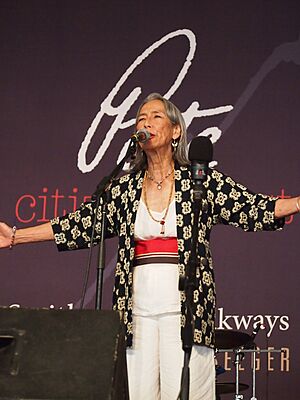Nobuko JoAnne Miyamoto facts for kids
Quick facts for kids Nobuko JoAnne Miyamoto |
|
|---|---|
 |
|
| Background information | |
| Born | November 14, 1939 Los Angeles, California |
| Origin | Los Angeles, California |
| Genres | Folk |
Nobuko JoAnne Miyamoto was born on November 14, 1939. She is a Japanese-American folk singer, songwriter, and author. She is also an activist who works for social change. Nobuko Miyamoto was an important part of the Asian American Movement.
She was a member of a music group called Yellow Pearl. Her bandmates were Chris Kando Iijima and Charlie Chin. They are famous for their 1973 folk album, A Grain of Sand: Music for the Struggle by Asians in America. This album is known as the first Asian-American album in history. Later, in the late 1970s, she was part of another band called Warriors of the Rainbow.
In 2021, Nobuko Miyamoto released an album titled 120,000 Stories. This name refers to the large number of Japanese Americans who were held by the U.S. government during World War II. Miyamoto herself was one of these people. She uses her music to speak out about important issues. These include climate change and the goals of the Asian American and Black Lives Matter movements.
Nobuko Miyamoto's Early Life
Nobuko Miyamoto was born in Los Angeles, California, on November 14, 1939. Her earliest memory is from the Santa Anita Park racetrack. This was a temporary holding place for her family. They were sent there before being moved to special camps for Japanese Americans. This happened after President Franklin D. Roosevelt signed Executive Order 9066. This order allowed the government to imprison many Japanese Americans.
Miyamoto and her family were later sent to Glasgow, Montana. Her father volunteered to work on a beet farm there. Eventually, they were allowed to live with Miyamoto's grandfather. They lived in Parker, Idaho, and then Ogden, Utah, until World War II ended.
Dancing Career
After the war, Miyamoto started dancing. She began to appear in movies and stage shows. During this time, she was known as Joanne Miya. When she was 15, she was in the 1956 film version of The King and I.
She also played Francisca in the 1961 film West Side Story. Francisca was the girlfriend of one of the Sharks gang members. Nobuko appeared in all the Sharks' musical scenes.
Later, she performed in the Broadway show Flower Drum Song. However, she became unhappy with how Asian people were shown in American popular culture. Because of this, she left the show and moved to Seattle.
Music and Activism
In 1968, Miyamoto joined Italian director Antonello Branca. He was making a documentary about the Black Panther Party in New York City. She quickly became a supporter of the Panthers' cause. She also became friends with activist Yuri Kochiyama. Nobuko Miyamoto spoke out against the Vietnam War. She was also one of the first people to use the term "Asian American".
In 1972, Miyamoto and Chris Iijima were invited to The Mike Douglas Show. Yoko Ono and John Lennon were guest hosts. On the show, the duo sang "We Are the Children." This song spoke about being "the offspring of the concentration camp." Yellow Pearl did not appear on television again after this.
Yellow Pearl released their album A Grain of Sand: Music for the Struggle by Asians in America in 1973. The album talked about Asian American experiences. It also covered topics like Black Liberation and returning land to Indigenous people. Republic of New Afrika members Atallah Muhammad Ayubbi and Mutulu Shakur also joined Miyamoto, Iijima, and Chin on the album.
Nobuko Miyamoto had a son named Kamau with Atallah Muhammad Ayubbi. Kamau later became an Imam and an artist. After the album's release, Atallah Muhammad Ayubbi passed away unexpectedly. Miyamoto then moved back to Los Angeles. She became involved with the Senshin Buddhist Temple. There, she began teaching dance classes.
In 1978, Miyamoto started an arts group called Great Leap. It was inspired by Buddhist ideas and focused on many cultures. After the 1992 Los Angeles riots, Miyamoto changed the group's goals. She wanted Great Leap to help build stronger connections between Black, Latino, and Asian communities. In 2000, she became a fellow at the Boggs Center in Detroit. She also became involved in urban farming.
After the events of September 11, 2001, Great Leap started hosting FandangObon. This is a festival that brings together Japanese, Mexican, and African American music and dance traditions in Los Angeles. Miyamoto founded the festival with Chicano musician Quetzal Flores.
 | Claudette Colvin |
 | Myrlie Evers-Williams |
 | Alberta Odell Jones |

